After-School Programs
Find a program in your areaUpcoming Free After-School Programs
Learning is fun, especially when you’re taking your ideas from concept to prototype! The Brilliant Labs After-School Programs offer youth, grades 2-12, the opportunity to code, design and explore tools that can help transform our world, with virtual as well as in person options. Topics vary, so please visit often for new programming updates.
Look at French programs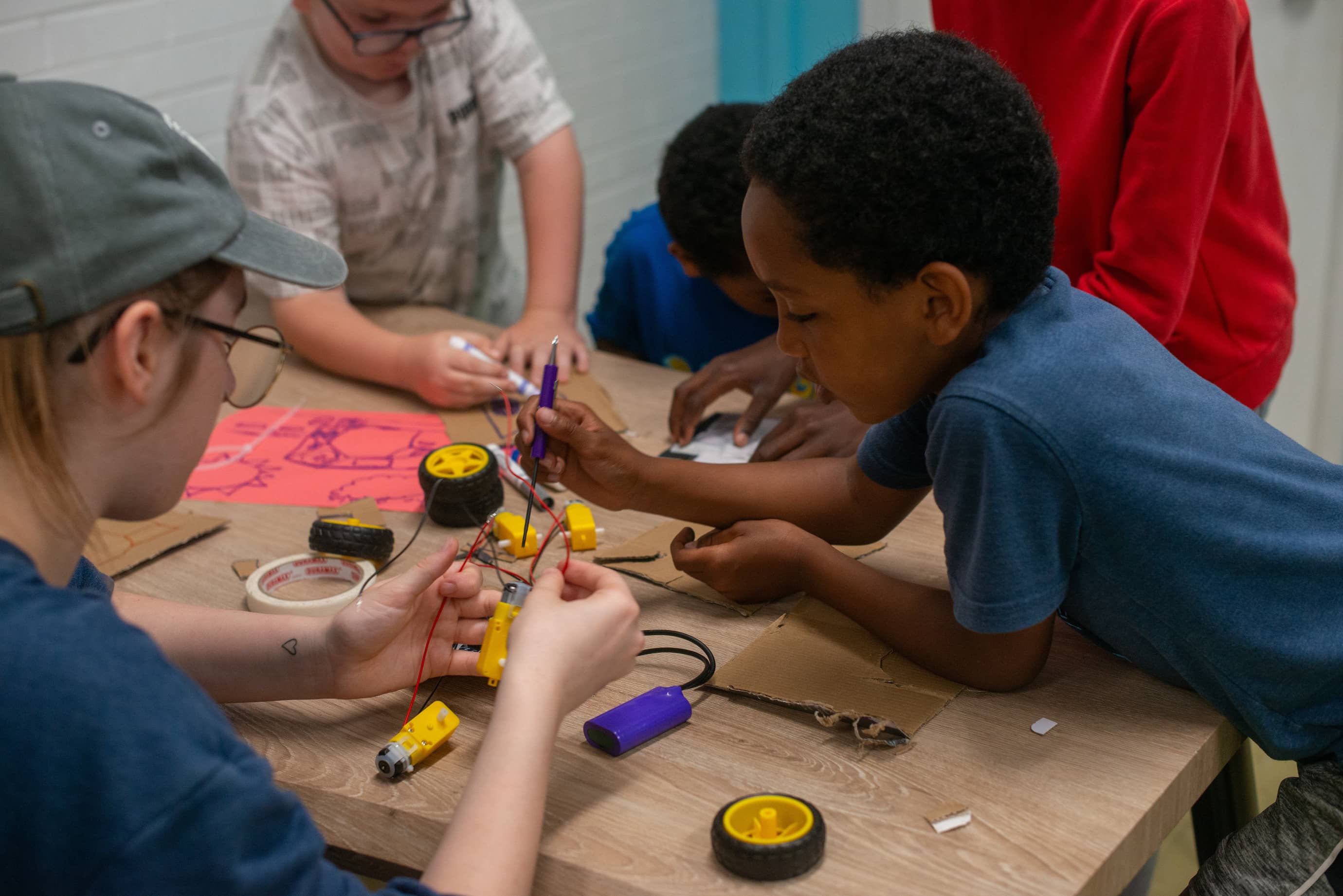
Virtual Programs >
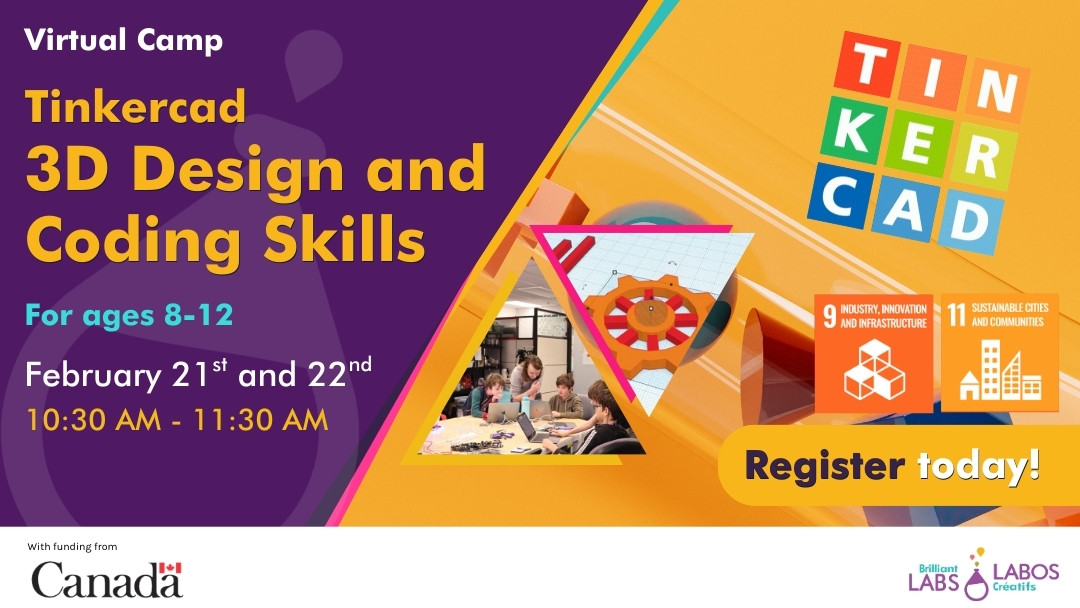
Virtual 3D Design in Tinkercad Weekend Camp: From 10:30-11:30am (AST) on February 21st & 22nd
Join us for this virtual Weekend Camp, all you need is a laptop or tablet and an internet connection! Throughout this program students will learn to do 3D Design/Modeling in Tinkercad, a popular introductory 3D Design program that is both powerful and also accessible.
Ages 8-12 | 10:30 - 11:30 am (AST) | Register Here
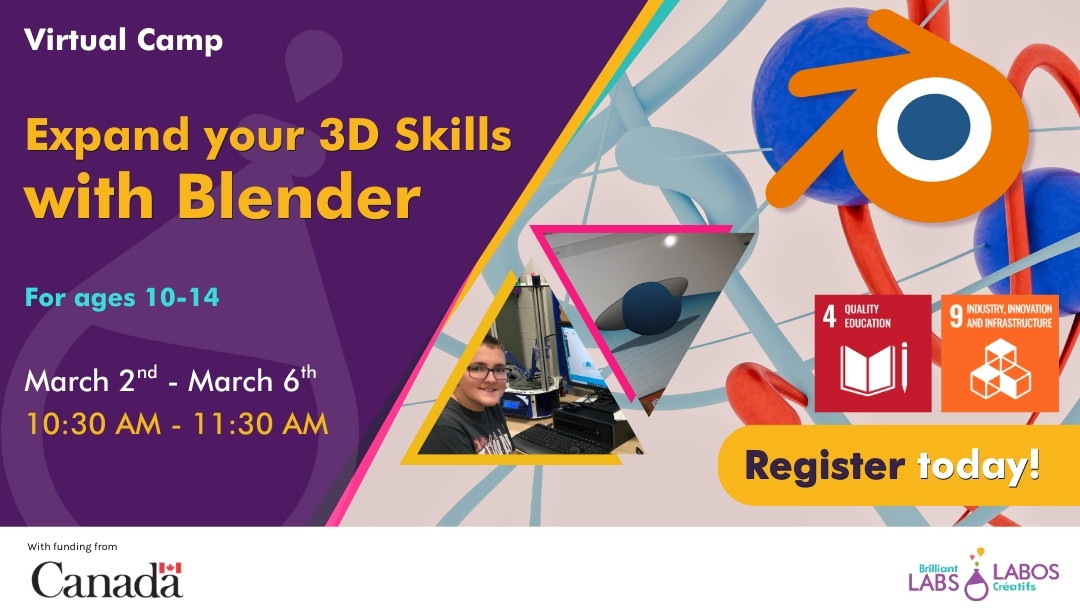
Virtual 3D Design in Blender March Break Camp: From 10:30-11:30am (AST) on March 2nd to 6th
Join us for this virtual March Break Camp, all you need is a computer and an internet connection! In this program students will get an introduction to one the biggest 3D design platforms, Blender that can be used for everything from animation to VFX to even designing video games!
Please note: Campers will need to install the free Blender software before the camp.
Ages 10-14 | 10:30 - 11:30 am (AST) | Register Here
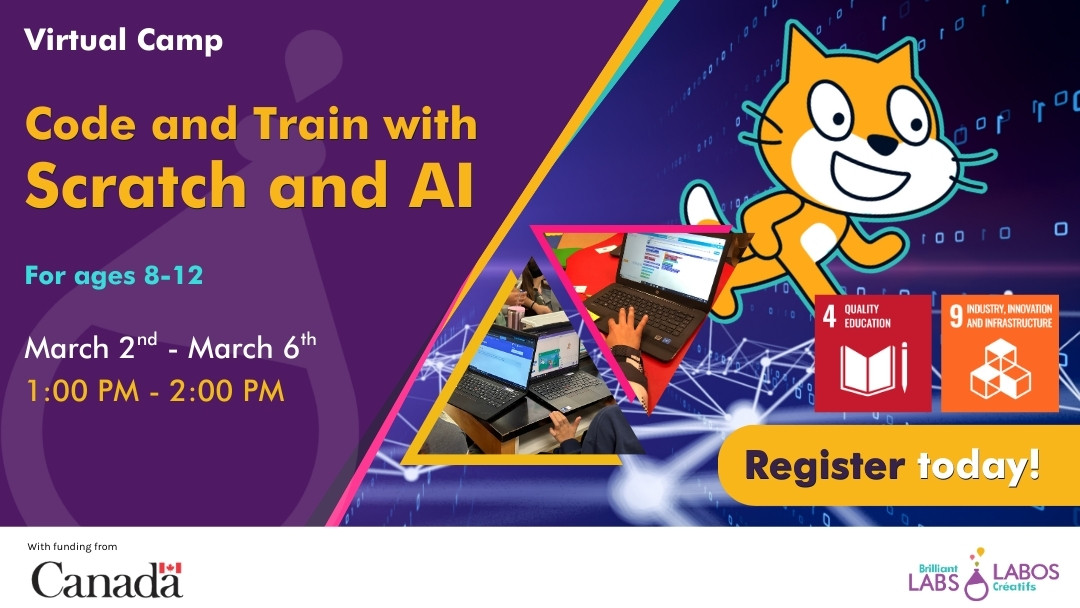
Virtual Introduction to Scratch March Break Camp: From 1:00-2:00pm (AST) on March 2nd to 6th
Join us for this virtual March Break, all you need is a laptop or tablet and an internet connection! In this program you will get an introduction to the basics of Scratch programming.
Ages 8-12 | 1:00 - 2:00 pm (AST) | Register Here
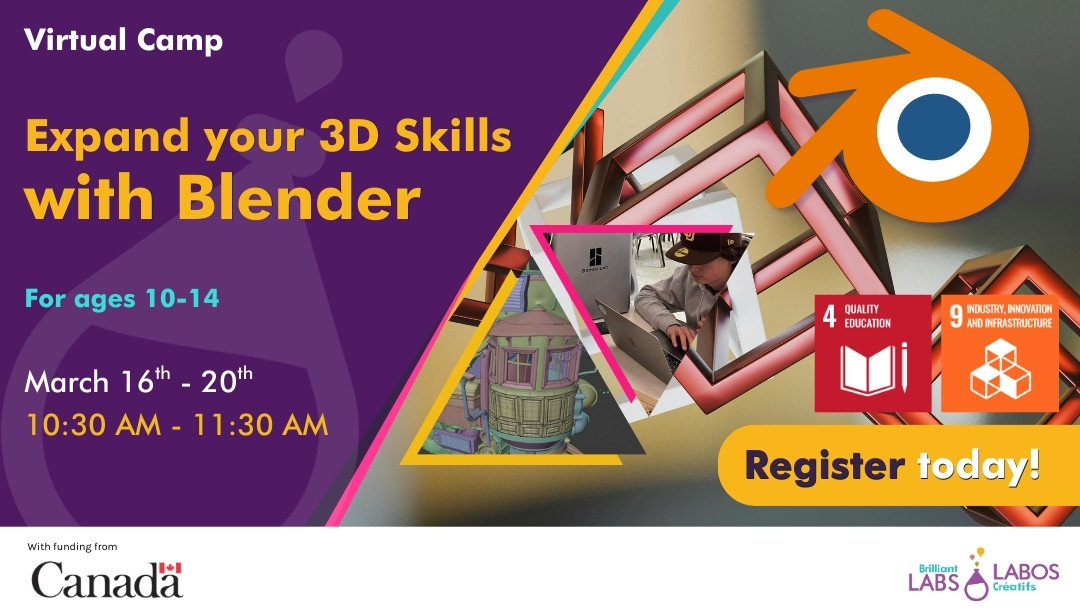
Virtual 3D Design in Blender March Break Camp: From 10:30-11:30am (ADT) on March 16th to 20th
Join us for this virtual March Break Camp, all you need is a computer and an internet connection! In this program students will get an introduction to one the biggest 3D design platforms, Blender that can be used for everything from animation to VFX to even designing video games!
Please note: Campers will need to install the free Blender software before the camp.
Ages 10-14 | 10:30 - 11:30 am (ADT) | Register Here
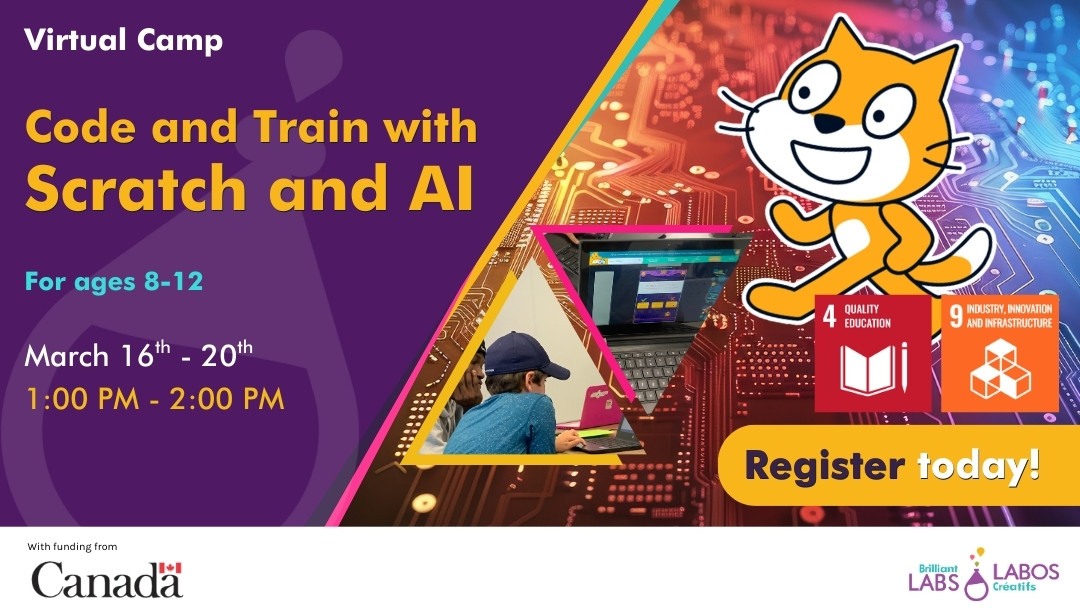
Virtual Introduction to Scratch March Break Camp: From 1:00-2:00pm (ADT) on March 16th to 20th
Join us for this virtual March Break, all you need is a laptop or tablet and an internet connection! In this program you will get an introduction to the basics of Scratch programming.
Ages 8-12 | 1:00 - 2:00 pm (ADT) | Register Here
In-Person Programs >
New Brunswick >
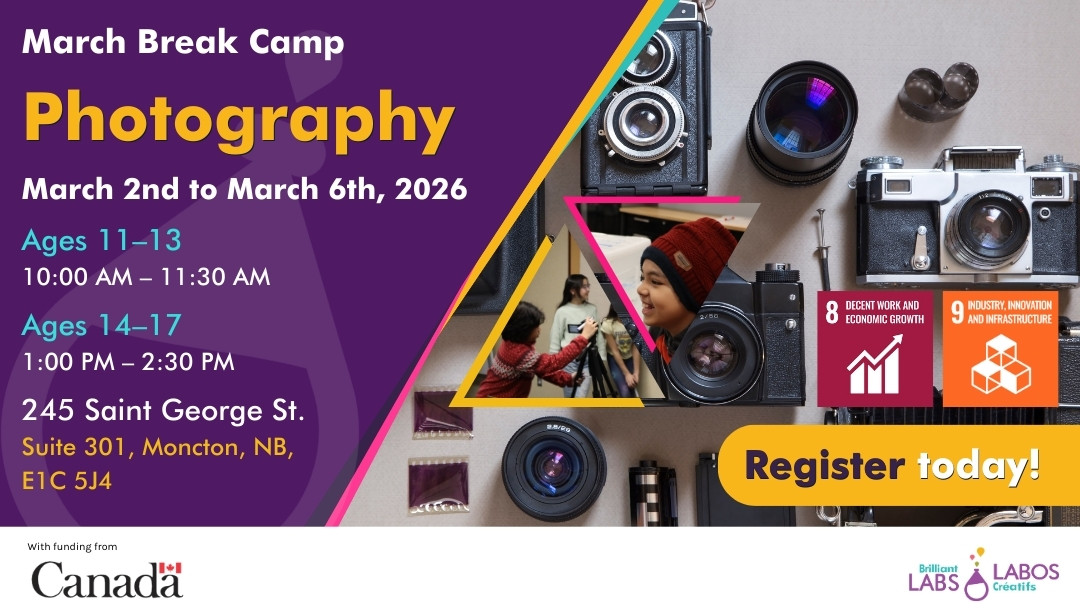
Photography Camp, Moncton, NB: 10:00am - 11:30am (ages 11-13) or 1:00pm-2:30pm (ages 14-17) from March 2nd to 6th
Join us in-person for this March Break Camp at the Brix Experience building, located at 245 Saint George St, Suite 301, Moncton, NB. Throughout this Photography March Break Camp students will learn the basics of photography including everything that goes into capturing great shots as well as some photo editing.
Ages 11-17 | 10:00 - 11:30 am (ages 11-13) or 1:00 - 2:30 pm (ages 14-17) | Register Here

Moncton Public Library, Moncton, NB: 10:30-11:30am or 1:00-2:00pm (AST) on March 2nd
Join us in-person for this March Break Camp at the Moncton Public Library, located at 644 Main Street, Moncton, NB. The morning session will focus on cybersecurity & AI and the afternoon session will focus on robotics. Students may join for one session or both.
Ages 8-12 | 10:30 - 11:30 am or 1:00 - 2:00 pm (AST) | To register call (506) 869-6000 or email BiblioMonctonLib@gnb.ca
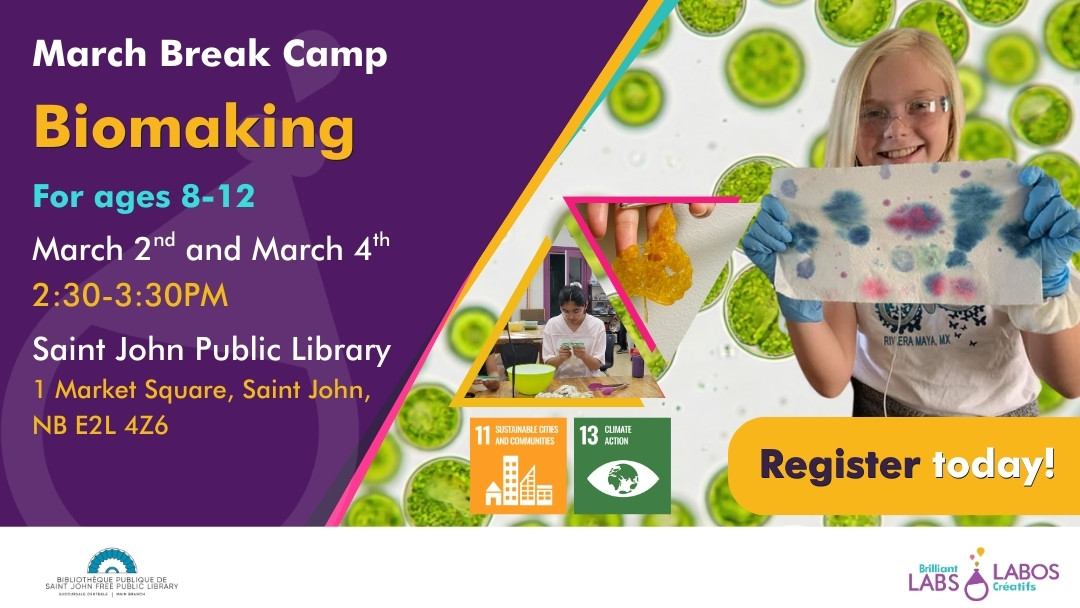
Saint John Public Library, Saint John, NB: 2:30-3:30pm (AST) on March 2nd & 4th
Join us in-person for this March Break Camp based out of the Saint John Public Library, located at 1 Market Square, Saint John, NB. During this camp we will explore the world of Biomaking!
Please note: This program is bilingual
Ages 8-12 | 2:30 - 3:30 pm (AST) | To register call 506-643-7239 or email BiblioLib-sj-child-enf@gnb.ca
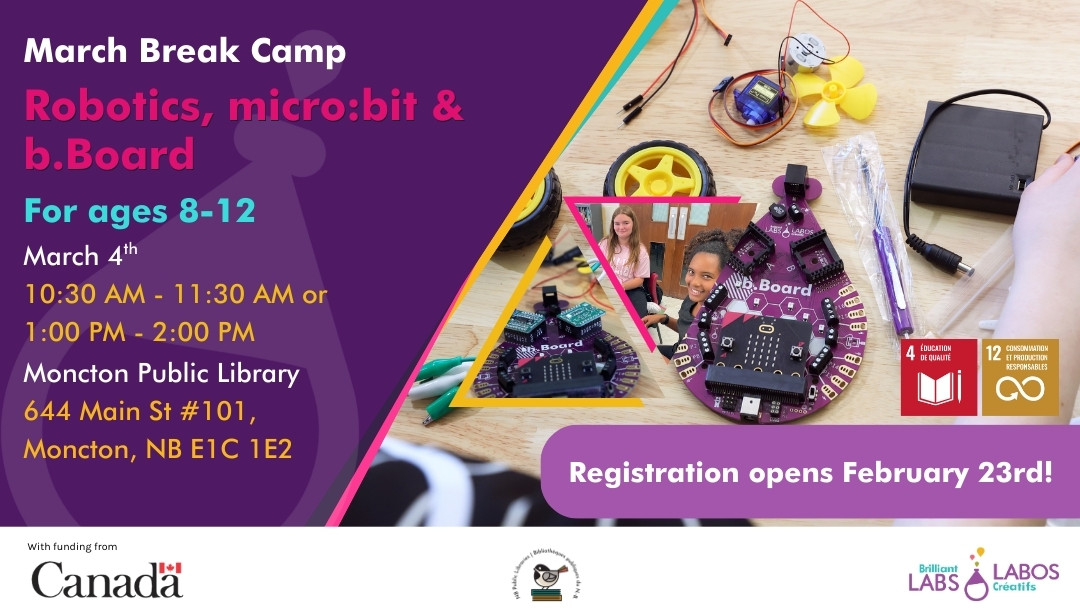
Moncton Public Library, Moncton, NB: 10:30-11:30am or 1:00-2:00pm (AST) on March 4th
Join us in-person for this March Break Camp at the Moncton Public Library, located at 644 Main Street, Moncton, NB. The morning session will focus on cybersecurity & AI and the afternoon session will focus on robotics. Students may join for one session or both.
Please note: this program is French
Ages 8-12 | 10:30 - 11:30 am or 1:00 - 2:00 pm (AST) | Registration opens February 23rd
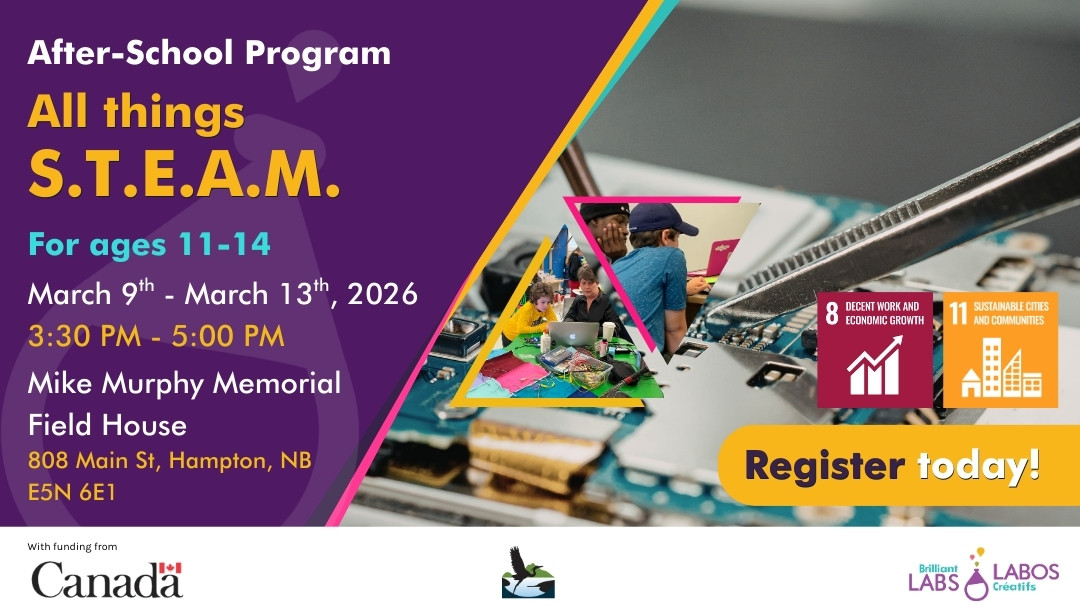
Mike Murphy Memorial Field House, Hampton, NB: 3:30-5:00pm (ADT) from March 9th to 13th
Join us in-person for this after-school program at the Mike Murphy Memorial Field House, located at 808 Main St, Hampton, NB. This program will focus on robotics while touching on a variety of other STEAM topics such as coding and AI!
Ages 11-14 | 3:30 - 5:00 pm (ADT) | Register Here
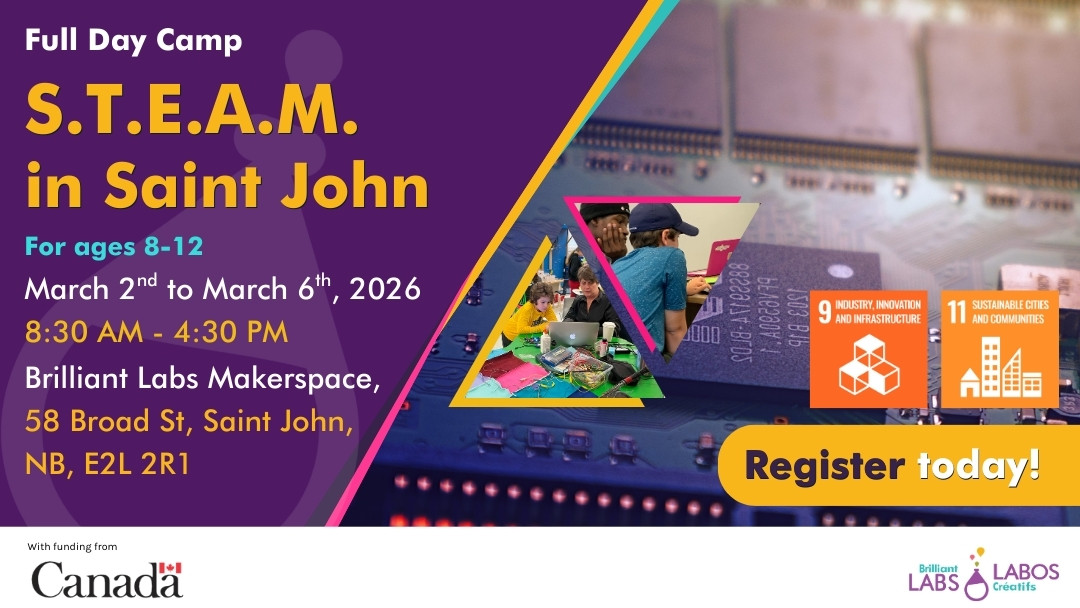
Brilliant Labs Makerspace, Saint John, NB: 8:30am-4:30pm (AST) from March 2nd to 6th
Join us in-person for this March Break Camp based out of our Saint John Makerspace, located at 58 Broad St, Saint John, NB. Throughout this week-long free program we'll explore Cyber Security, Artificial Intelligence, and Robotics!
Ages 8-12 | 8:30 am - 4:30 pm (AST) | Registrations are closed for this program
Newfoundland and Labrador >
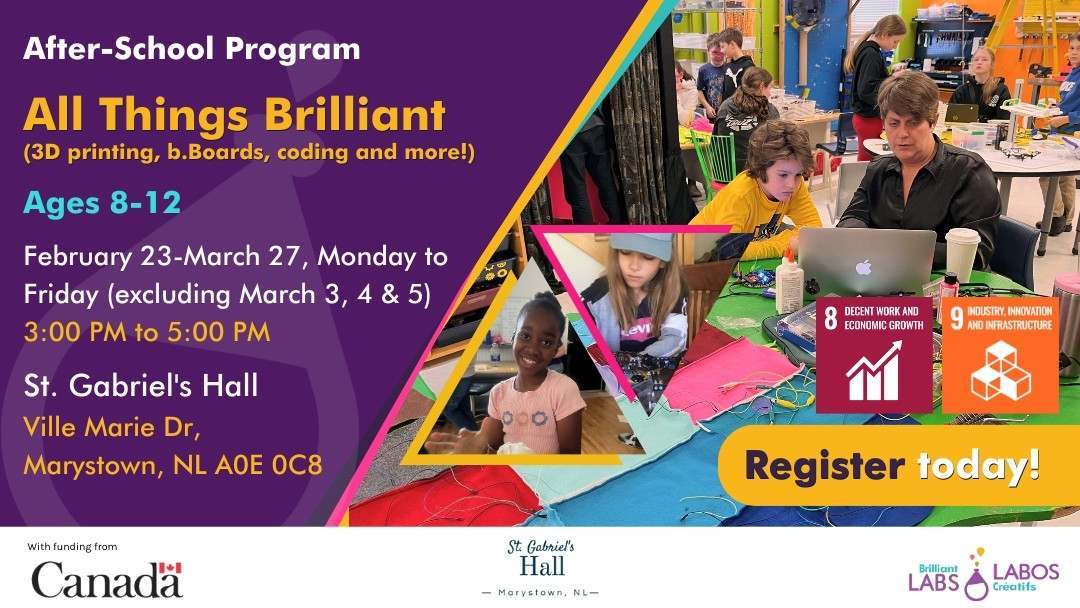
St. Gabriel's Hall, Marystown, NL: Monday to Friday at 3:00-5:00 pm (NT) from February 23th - March 27th (excluding March 3rd, 4th & 5th)
Join us for this in-person after-school program at St. Gabriel's Hall located at Ville Marie Dr, Marystown, NL. This program will cover all things brilliant, including 3D pritning, b.Board, coding & more!
Ages 8-12 | Monday to Friday from 3:00 - 5:00 pm (NT) | Register Here
Prince Edward Island >
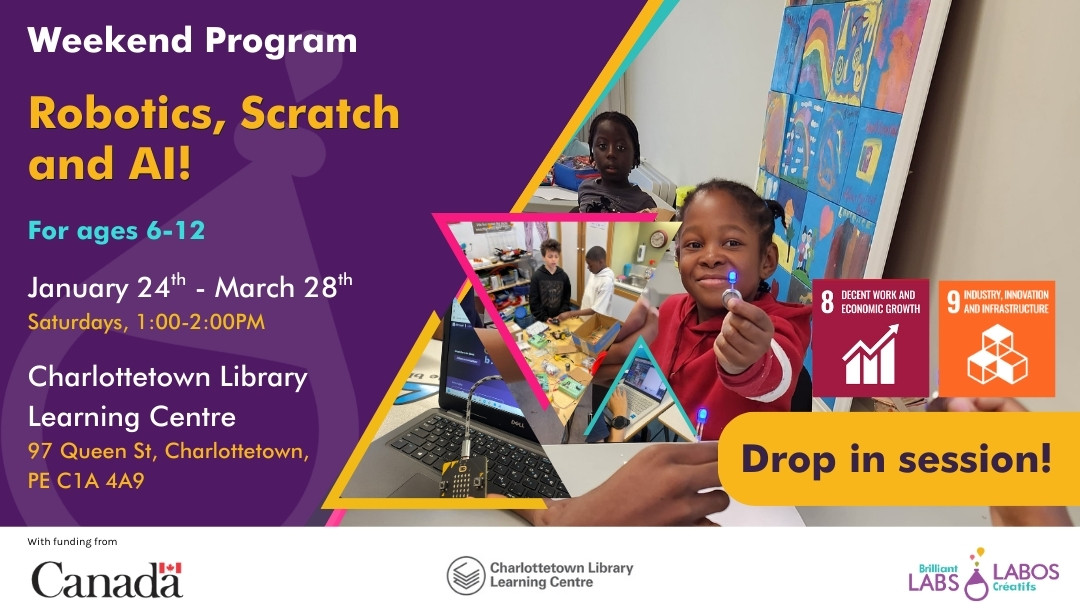
Charlottetown Library Learning Centre, PEI: Saturdays at 1:00-2:00pm (AT) from January 24th to March 28th
Join us at the Charlottetown Library Learning Centre, located at 97 Queen St, Charlottetown, PEI for weekly drop-in sessions where we'll explore Robotics, Scratch & AI!
Please note: This program is bilingual
Ages 6-12 | Saturdays from 1:00 - 2:00 pm (AT) | To join this program just meet us at the Learning Centre!

Charlottetown Library Learning Centre, PEI: 10:30-11:30am (ADT) on March 16th, 17th, 19th & 20th
Join us at the Charlottetown Library Learning Centre, located at 97 Queen St, Charlottetown, PEI for this March Break Camp. Themes will include Robotics, AI, and more!
Please note: This program is bilingual
Ages 8-12 | Monday, Tuesday, Thursday & Friday from 10:30 - 11:30 am (ADT) | Register Here
THANK YOU
Brilliant Labs’ after-school and STEAM camp program is made possible with support from the Government of Canada’s CanCode program.
With funding from

Want to work with us?
With over 1,253,049 youth experiences provided and thousands of school/community events, workshops, and student-led projects under our belt, the impact you can make with Brilliant Labs is limitless. Whether it's in Atlantic Canada or beyond, your contribution can help educators and students shine bright.
From time to time we are looking for a diverse range of roles that include: STEAM mentors, support staff, volunteers, and experts from fields such as ICT, engineering, education, art, animation, gaming, and sustainable solution solvers. If you have the expertise and the heart to inspire, we're looking for you!
Apply Now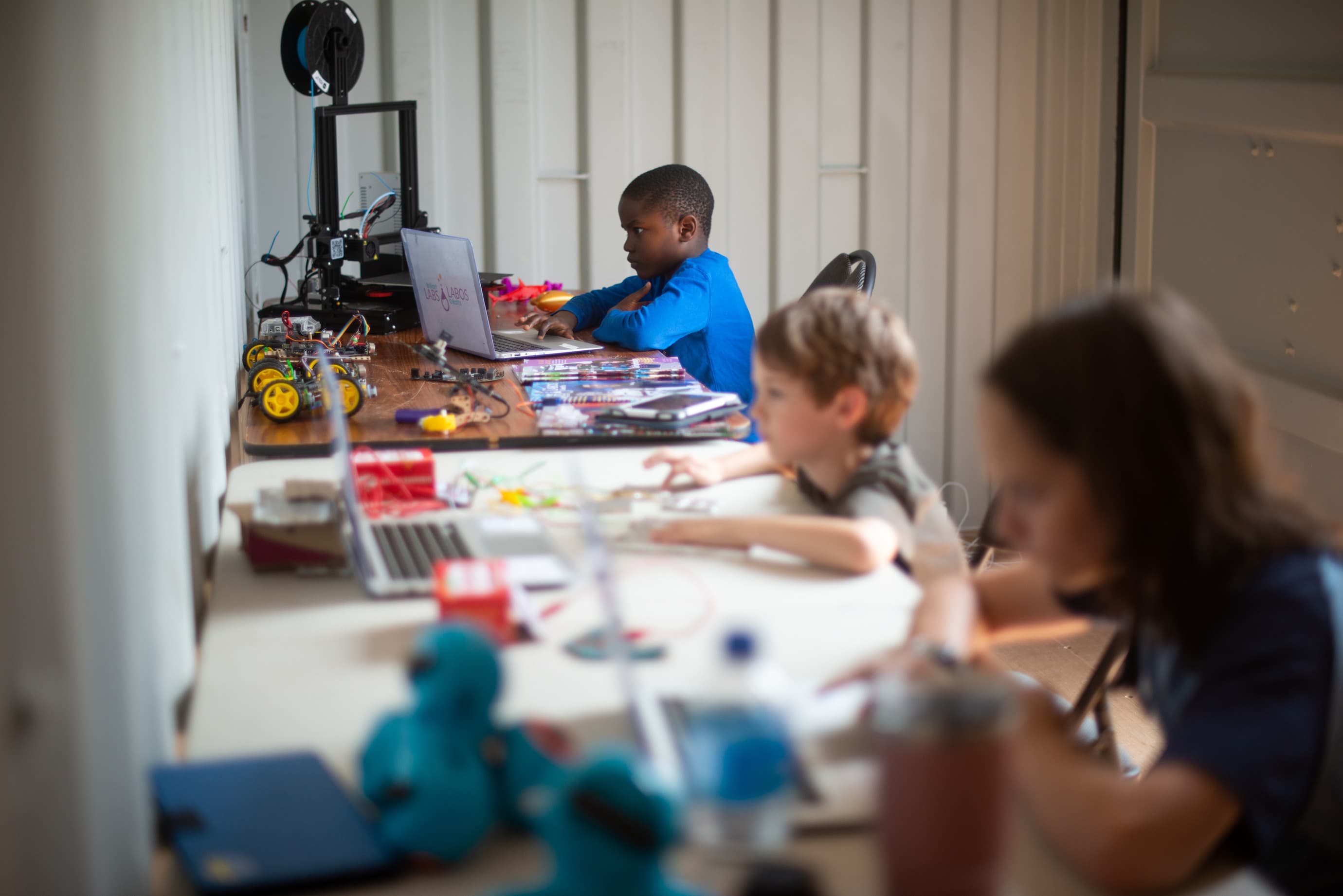
Thinking globally, and acting locally in Atlantic Canada
Brilliant Labs is fully committed to the United Nations Sustainable Development Goals
(SDGs), a
global
initiative to end poverty, fight inequality and tackle climate change by 2030.
We empower youth to learn and make an impact by engaging them with these issues in their
schools
and
communities.
